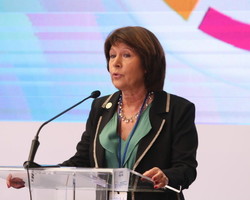Déclaration du docteur Piroska Östlin, directrice régionale par intérim, à l'ouverture de la cinquième session de la Réunion des parties au Protocole sur l’eau et la santé

Royal Tours
Prime Minister Brnabić,
Executive Secretary Algayerova,
Your Excellencies,
Distinguished Colleagues,
On behalf of the WHO Regional Office for Europe, it’s my pleasure to address this fifth Meeting of the Parties to the Protocol on Water and Health.
I would like to thank our host, the Republic of Serbia, for enabling this important meeting to take place in their beautiful capital city of Belgrade.
I also want to acknowledge UNECE for being an excellent partner. I thank Ms Algayerova and her team for sharing our passion for progress in our region.
We know the numbers on the lack of satisfactory water and sanitation. But I remind you, these are not just numbers. These are people. These are people, like you and me, who still lack access to something so fundamental that most of us take it for granted. Consider that next time you drink a glass of tap water. Next time you wash your hands. And next time you flush the toilet.
Indeed, next time you flush—today, on World Toilet Day—appreciate that you didn’t need to go outside, or somewhere else unacceptable, to relieve yourself, like 31 million people in our region. Recognize that the toilet was not just a toilet — it protected your dignity, as well as your health, and the health of those around you. And understand why sanitation and water are our human rights. We need safe management of human waste and good toilets for all, if we are to leave no one behind.
Imagine a woman giving birth in a hospital that lacks a shower and toilet. Quality health care simply cannot exist without reliable and safe water, sanitation and hygiene. We cannot tackle the deadly threat of antimicrobial resistance, nor can we have “health for all” without adequate WASH in all health care facilities.
Now imagine a boy sat in class trying to ignore his need to pee. Or a girl having her first period. And neither being able to go to a bathroom. Five million children across the region still lack adequate sanitation facilities in schools. This not only affects their dignity and well-being, but also impedes their right to education. To tackle this, we have worked with the education sector and youth, and we can now provide practical guidance to school staff on how to improve health and learning through better WASH.
Globally, around 1.9 billion women and girls are of reproductive age. Yet a massive taboo and stigma surrounds menstruation. In European countries, girls miss several days of school while on their period, due to poor facilities and inability to afford hygiene products. To highlight this issue of menstrual poverty, WHO is providing menstrual hygiene products—free—to all participants of this Meeting.
Over the next days, we will hear voices collected from all over the region on what water and sanitation means to them. Water and sanitation matters to these people. It matters to every single person in the whole world. It matters to us.
We have the Protocol on Water and Health, a unique mechanism to respond to these concerns. An instrument bringing together actors from multiple disciplines, to care for and protect all of us in our region by ensuring adequate, accessible and safe water, sanitation and hygiene.
Together, over the past decade, we have achieved a lot. Yet we continue to experience water-related diseases and outbreaks. In our region, 14 people die every day from diarrhoea due to poor WASH. Two medium-sized plane crashes every month sounds outrageously unacceptable – but it is the same number of people.
Surveillance and outbreak management is a core public health function. Any improvement, whether in a large city or in small-scale rural system, must be sustainable and resilient to be able to protect our future generations in a changing climate.
It is embarrassing that basic WASH is a lingering problem in our region. Now we call on you. To work together. To learn from each other. And to set and achieve your national targets. By doing so, we can also finally achieve the WASH-related commitments of the SDGs and the Ostrava Declaration.
We heard Secretary-General António Guterres reiterate his call for WASH in all health care facilities by 2030. We need to ensure that, by definition, every health care facility has improved water, sanitation and hygiene.
We need to ensure that every child’s right to education is not compromised, and that we eliminate diarrhoea caused by poor water, sanitation and hygiene.
And, we need to ensure that progress is equitable, safely-managed and climate resilient.
This is the Protocol on Water and Health.
I wish you a productive meeting. Thank you.



